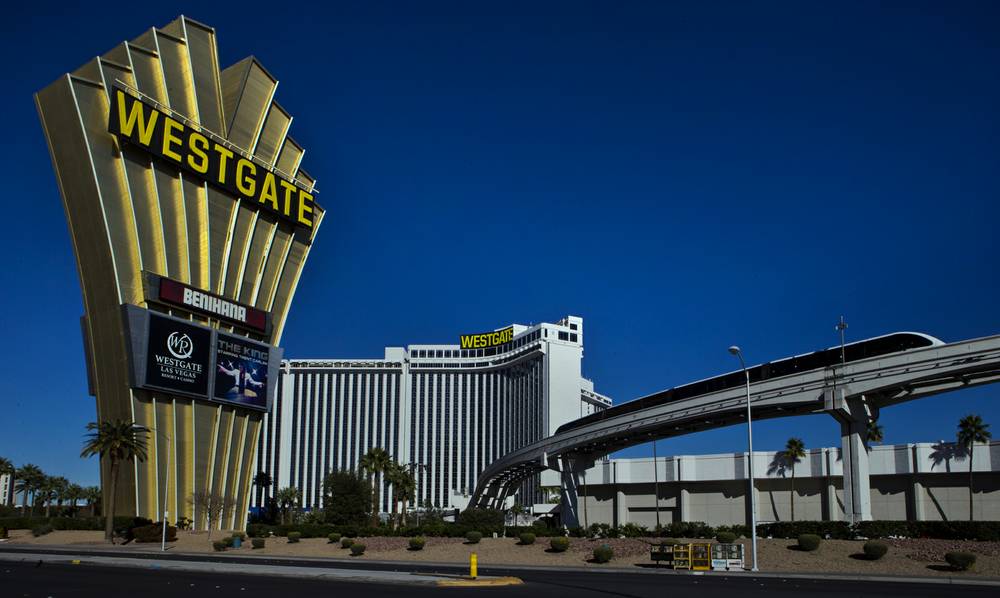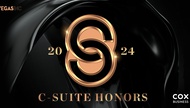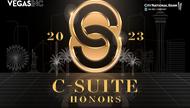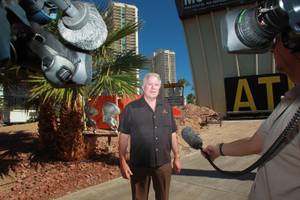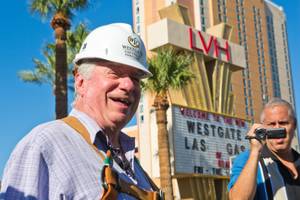In 1969, Elvis made a comeback at the largest hotel in the world. The International was also the first true megaresort in Las Vegas, dazzling all comers with its cavernous showroom, luxurious suites and tri-form tower dominating the skyline.
In 1978, it hosted one of the biggest upsets in boxing history when Muhammad Ali’s heavyweight title was snatched by Leon Spinks. By then the property had been sold and renamed the Las Vegas Hilton, which racked up historic and cultural bullet points, from the scandalous 1991 Navy Tailhook meeting to the essentially weird Star Trek: The Experience attraction.
Needless to say, the place had a presence. At least until 2011, when Colony Capital and Resorts International took over and unceremoniously renamed it LVH. In a blink, the storied casino-resort fell out of the capricious Vegas spotlight, though its vastness and just-off-Strip location smoldered with potential. Restyling older casinos has become commonplace in today’s Vegas. We watched Imperial Palace become the Linq, Barbary Coast become the Cromwell, and Sahara become SLS. The once-glorious Las Vegas Hilton has the best bones of them all, so it was only a matter of time before a new owner would pounce.
David Siegel is that man. The 79-year-old founder and CEO of Florida-based Westgate Resorts— one of the big three of the timeshare industry, along with Wyndham and Marriott—purchased the property for around $160 million last summer and announced he would spend at least that much remaking it into Westgate Las Vegas. He’s connected to the property in a way that makes it seem like this was inevitable all along.
“I definitely saw a great opportunity here, but more important, it felt like it was my destiny to own the former International Hotel and make it a Westgate resort,” Siegel says. Not only were his parents frequent Vegas visitors in the ’60s, ’70s and ’80s, his former father-in-law worked as an entertainment manager for the Grand Ole Opry and was friends with Colonel Tom Parker. “One day [Parker] came to him and said, ‘I’ve got this hick singer and I want you to manage him.’ My father-in-law already had Eddy Arnold and Minnie Pearl and passed on this singer, so his best friend Colonel Tom Parker kept Elvis for himself, and the rest is history.”
When the International was six months old, Siegel visited with his family and saw Elvis perform for the first time. “Parker put us in the best seats in the showroom, right in front of the stage. I went back and saw him probably 15 times over the years. Little did I know some 45 years later on I’d be buying the hotel, but it does feel like I was kind of destined to do it.”
This isn’t Siegel’s first foray into Las Vegas. Westgate opened the Flamingo Bay timeshare resort in 1999, three miles off the Strip on Flamingo Road as a 200-unit complex. “That was to get our feet wet in Vegas, and it was very successful,” Siegel says. His next move was much bigger, partnering with the Planet Hollywood resort on the Strip to build PH Towers, a 50-story building with 1,200 villas that opened in 2009. But the timing couldn’t have been worse. The recession was doing major damage to the entire timeshare industry, and the Lehman Brothers bankruptcy killed the Towers’ financing. Siegel says the banks “pulled the carpet out from under us” and eventually made a deal to sell the building in 2011. Today it’s Elara, a Hilton Grand Vacations resort.
“We went from being on top of the world in Vegas to losing our prize resort,” Siegel says. “But I’m a firm believer that when one door closes, another opens, and as a result we now have Westgate Las Vegas. Our former property had 1,000 units, and this has 3,000. We didn’t have a casino, restaurants and meeting space. It was just a hotel, a dormitory. Today we have a 100,000-square-foot casino and 200,000 square feet of meeting space right next to the Convention Center. We have 62 acres of prime land we’ll be developing for the next 25 years.”
The goal is to do more than restore the property to its former glory—Siegel wants to make it better than it ever was. “Not an inch of the property will be untouched,” he said.
All of the hotel rooms will be renovated—about 1,200 have already been refurbished—and a few hundred will be converted into timeshare units each year. Some of those conversions will be completed by knocking down walls and combining rooms. For example, the typical hotel room at Westgate is 450 square feet, so they’ll combine three to make a 1,350-square-foot, two-bedroom “lockout” suite, where you can close and lock adjoining doors to have a master suite with jacuzzi and kitchenette and a grand suite with a full kitchen, living room, bedroom and bath. Eventually, there also will be four-bedroom and six-bedroom units, now under construction.
Siegel says that after 15 or 20 years, when most of the hotel rooms have been converted into timeshares, Westgate will still have 30 percent of its rooms available at any given time for hotel reservations. “It will always be a convention hotel.”
Restaurant revamps are on the way, too. Westgate already added Sid’s Cafe, a classic coffee shop named for Siegel’s father, and new steakhouse, Italian and Mexican restaurants are in the works. A nightclub and dayclub is planned for the expansive bar and lounge space where the Star Trek attraction once operated.
The Westgate’s other strong assets include the iconic SuperBook, still the biggest race and sports book around, and one of the most convenient and active monorail stations along the tourist corridor—aided by close proximity to the Convention Center. Big Vegas entertainment has always been the property’s most prominent feature, and Siegel will double down. An announcement is planned for next week with details on a partnership with the Graceland estate that will create a new Elvis attraction and show at Westgate. The revamped Shimmer Cabaret has already been retrofitted with new shows, including the long-popular local Prince tribute Purple Reign and topless production Sexxy.
If all these plans and changes sound a little different from what’s going on along the Strip, that’s the idea. “It won’t be the newest hotel in Las Vegas but it will be just as nice, and it will be the friendliest,” Siegel says. “Our motto is to treat every guest like a high roller. We’re not going after the kids that come from LA bringing their cooler and their six-packs. We cater to middle America, people that want to vacation within their budget but feel like a Rockefeller.”
Las Vegas gets something more from the deal than a refreshed casino. Siegel is a character, another bold businessman to add to the legacy of colorful casino operators. He’s probably most recognized now for the 2012 documentary The Queen of Versailles, which followed Siegel and his wife Jackie in their quest to build one of the largest and most expensive homes in the country against the crushing backdrop of the recession. Siegel sued the filmmakers for defamation. He also famously campaigned for thousands of his employees to vote for George Bush in 2000, ostensibly swaying the Florida results that cost Al Gore the presidency, and caused political controversy again in 2012 by emailing employees the message that if Barack Obama was re-elected, it might force Siegel to make some layoffs.
Despite such tabloid fodder, Westgate Resorts’ post-recession turnaround is undeniable—the company earned $742 million in 2013, up 23 percent from 2012. Siegel has rehired about 5,000 employees, including most of those who lost their jobs during the recession, and he also bought the Arena Football League’s Orlando Predators last year. His business is thriving, which made this the right time to do Las Vegas his way.
“I would like to leave my mark on Vegas, but I’m not egotistical enough to think I’m in the league of those legendary guys who transformed Vegas into what it is today,” Siegel says. “But in doing so, those guys left out an important segment of the population. That’s our customer and that’s been our timeshare customer, someone who works hard and wants a good quality vacation they can afford, and that’s what we’re all about.”
